Organizational Behaviour: Culture, Politics, Power & Motivation-TUI
VerifiedAdded on 2024/05/31
|28
|7313
|366
Report
AI Summary
This report analyzes the influence of culture, politics, and power on individual and team behavior within an organizational context, specifically focusing on TUI Group. It evaluates content and process theories of motivation, examining how motivational techniques can effectively achieve organizational goals. The report also demonstrates an understanding of what constitutes an effective team, contrasting it with an ineffective one, and applies concepts and philosophies of organizational behavior to a given business situation within TUI Group. Key areas explored include Hofstede's cultural dimensions, network and systems theories, organizational psychology, and the impact of globalization and digital technology on organizational culture.
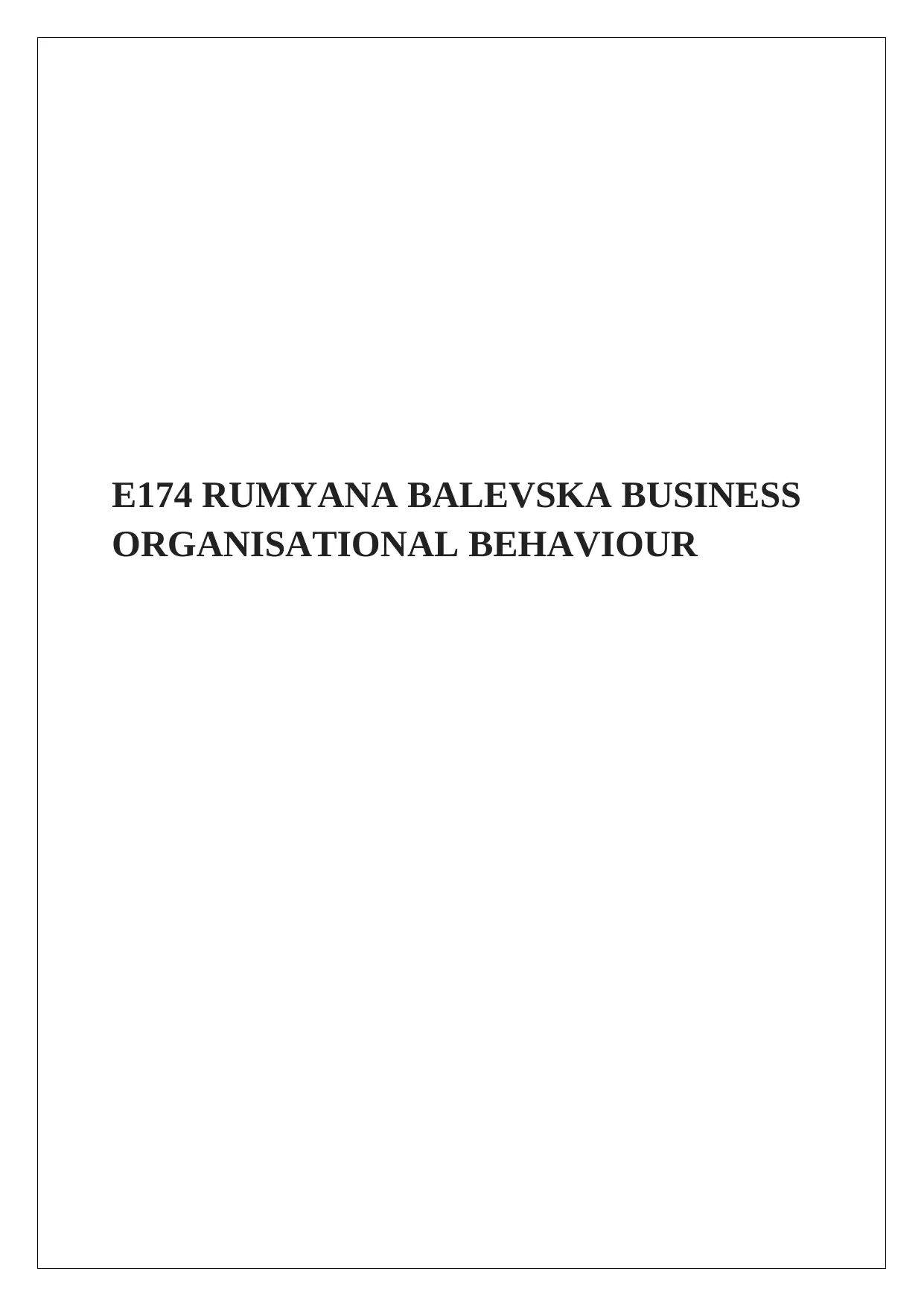
E174 RUMYANA BALEVSKA BUSINESS
ORGANISATIONAL BEHAVIOUR
ORGANISATIONAL BEHAVIOUR
Paraphrase This Document
Need a fresh take? Get an instant paraphrase of this document with our AI Paraphraser
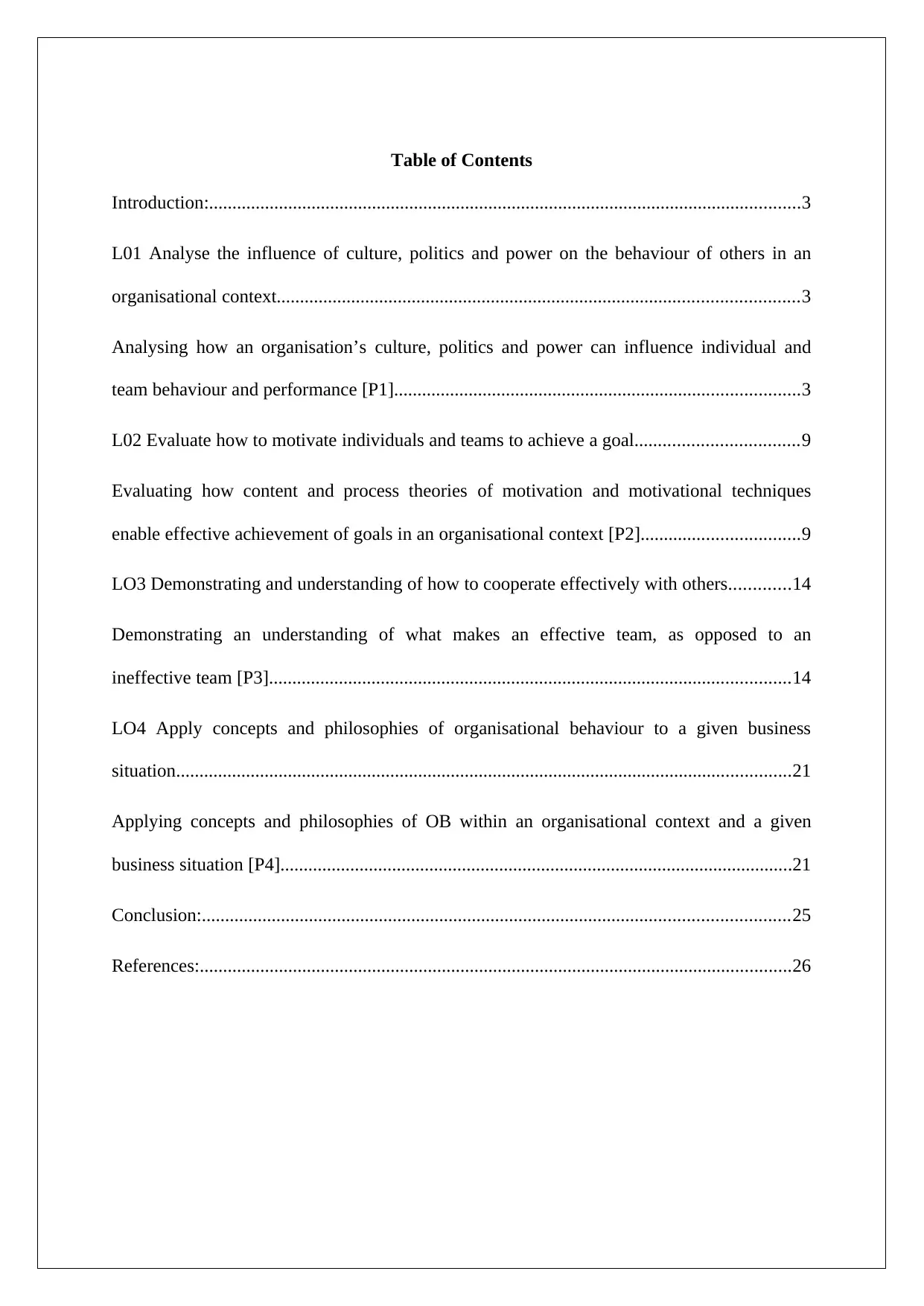
Table of Contents
Introduction:...............................................................................................................................3
L01 Analyse the influence of culture, politics and power on the behaviour of others in an
organisational context................................................................................................................3
Analysing how an organisation’s culture, politics and power can influence individual and
team behaviour and performance [P1].......................................................................................3
L02 Evaluate how to motivate individuals and teams to achieve a goal...................................9
Evaluating how content and process theories of motivation and motivational techniques
enable effective achievement of goals in an organisational context [P2]..................................9
LO3 Demonstrating and understanding of how to cooperate effectively with others.............14
Demonstrating an understanding of what makes an effective team, as opposed to an
ineffective team [P3]................................................................................................................14
LO4 Apply concepts and philosophies of organisational behaviour to a given business
situation....................................................................................................................................21
Applying concepts and philosophies of OB within an organisational context and a given
business situation [P4]..............................................................................................................21
Conclusion:..............................................................................................................................25
References:...............................................................................................................................26
Introduction:...............................................................................................................................3
L01 Analyse the influence of culture, politics and power on the behaviour of others in an
organisational context................................................................................................................3
Analysing how an organisation’s culture, politics and power can influence individual and
team behaviour and performance [P1].......................................................................................3
L02 Evaluate how to motivate individuals and teams to achieve a goal...................................9
Evaluating how content and process theories of motivation and motivational techniques
enable effective achievement of goals in an organisational context [P2]..................................9
LO3 Demonstrating and understanding of how to cooperate effectively with others.............14
Demonstrating an understanding of what makes an effective team, as opposed to an
ineffective team [P3]................................................................................................................14
LO4 Apply concepts and philosophies of organisational behaviour to a given business
situation....................................................................................................................................21
Applying concepts and philosophies of OB within an organisational context and a given
business situation [P4]..............................................................................................................21
Conclusion:..............................................................................................................................25
References:...............................................................................................................................26
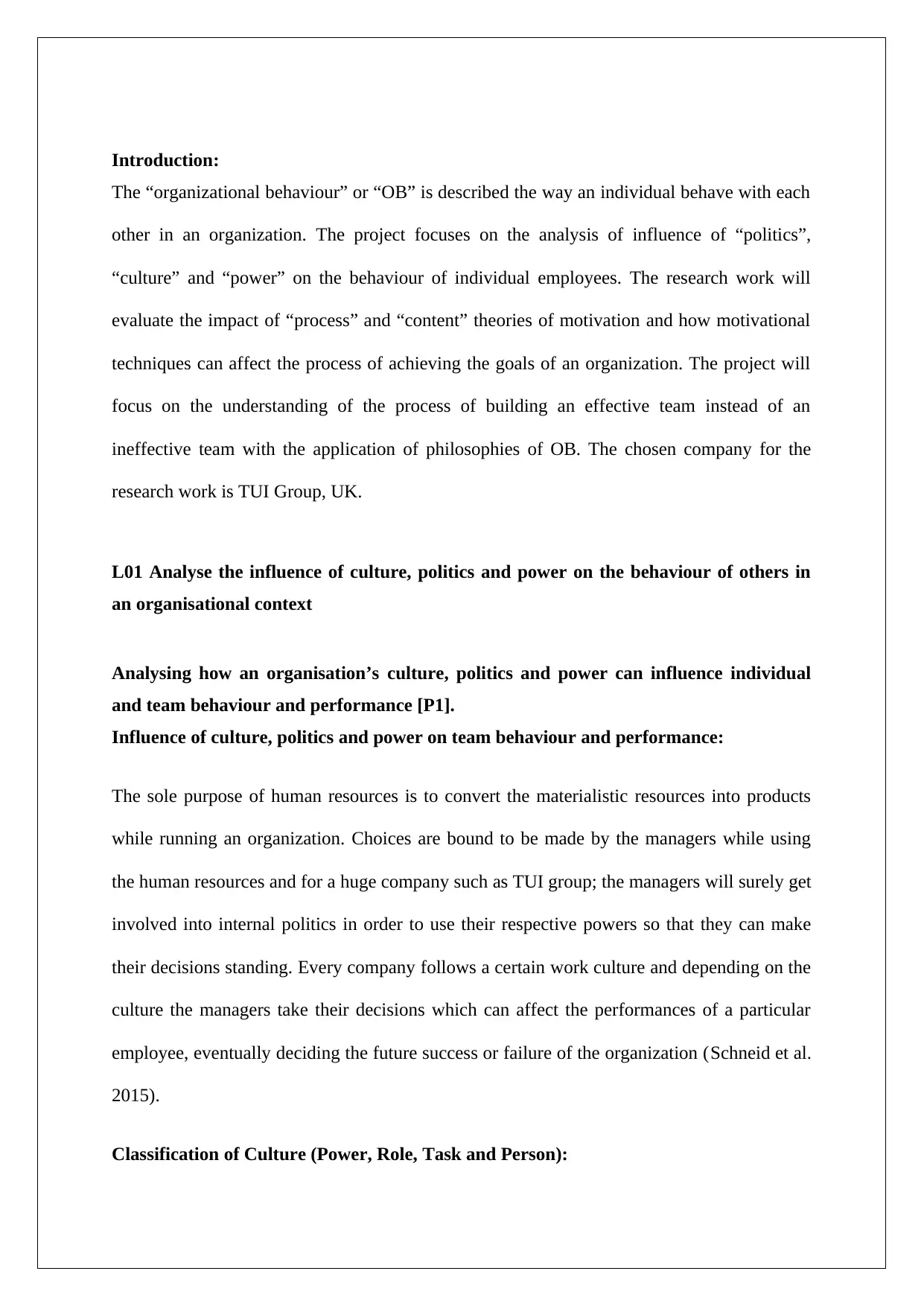
Introduction:
The “organizational behaviour” or “OB” is described the way an individual behave with each
other in an organization. The project focuses on the analysis of influence of “politics”,
“culture” and “power” on the behaviour of individual employees. The research work will
evaluate the impact of “process” and “content” theories of motivation and how motivational
techniques can affect the process of achieving the goals of an organization. The project will
focus on the understanding of the process of building an effective team instead of an
ineffective team with the application of philosophies of OB. The chosen company for the
research work is TUI Group, UK.
L01 Analyse the influence of culture, politics and power on the behaviour of others in
an organisational context
Analysing how an organisation’s culture, politics and power can influence individual
and team behaviour and performance [P1].
Influence of culture, politics and power on team behaviour and performance:
The sole purpose of human resources is to convert the materialistic resources into products
while running an organization. Choices are bound to be made by the managers while using
the human resources and for a huge company such as TUI group; the managers will surely get
involved into internal politics in order to use their respective powers so that they can make
their decisions standing. Every company follows a certain work culture and depending on the
culture the managers take their decisions which can affect the performances of a particular
employee, eventually deciding the future success or failure of the organization (Schneid et al.
2015).
Classification of Culture (Power, Role, Task and Person):
The “organizational behaviour” or “OB” is described the way an individual behave with each
other in an organization. The project focuses on the analysis of influence of “politics”,
“culture” and “power” on the behaviour of individual employees. The research work will
evaluate the impact of “process” and “content” theories of motivation and how motivational
techniques can affect the process of achieving the goals of an organization. The project will
focus on the understanding of the process of building an effective team instead of an
ineffective team with the application of philosophies of OB. The chosen company for the
research work is TUI Group, UK.
L01 Analyse the influence of culture, politics and power on the behaviour of others in
an organisational context
Analysing how an organisation’s culture, politics and power can influence individual
and team behaviour and performance [P1].
Influence of culture, politics and power on team behaviour and performance:
The sole purpose of human resources is to convert the materialistic resources into products
while running an organization. Choices are bound to be made by the managers while using
the human resources and for a huge company such as TUI group; the managers will surely get
involved into internal politics in order to use their respective powers so that they can make
their decisions standing. Every company follows a certain work culture and depending on the
culture the managers take their decisions which can affect the performances of a particular
employee, eventually deciding the future success or failure of the organization (Schneid et al.
2015).
Classification of Culture (Power, Role, Task and Person):
⊘ This is a preview!⊘
Do you want full access?
Subscribe today to unlock all pages.

Trusted by 1+ million students worldwide
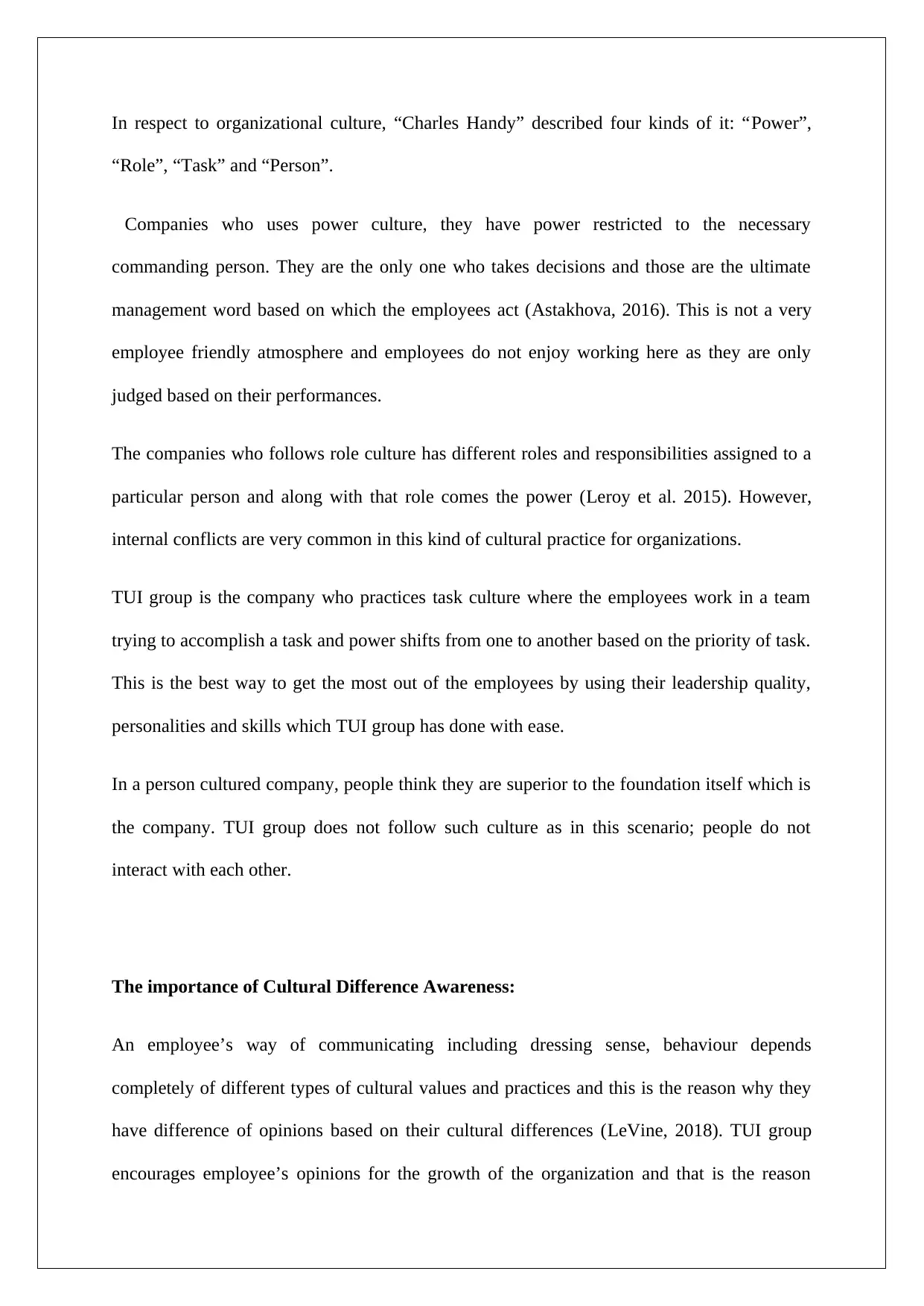
In respect to organizational culture, “Charles Handy” described four kinds of it: “Power”,
“Role”, “Task” and “Person”.
Companies who uses power culture, they have power restricted to the necessary
commanding person. They are the only one who takes decisions and those are the ultimate
management word based on which the employees act (Astakhova, 2016). This is not a very
employee friendly atmosphere and employees do not enjoy working here as they are only
judged based on their performances.
The companies who follows role culture has different roles and responsibilities assigned to a
particular person and along with that role comes the power (Leroy et al. 2015). However,
internal conflicts are very common in this kind of cultural practice for organizations.
TUI group is the company who practices task culture where the employees work in a team
trying to accomplish a task and power shifts from one to another based on the priority of task.
This is the best way to get the most out of the employees by using their leadership quality,
personalities and skills which TUI group has done with ease.
In a person cultured company, people think they are superior to the foundation itself which is
the company. TUI group does not follow such culture as in this scenario; people do not
interact with each other.
The importance of Cultural Difference Awareness:
An employee’s way of communicating including dressing sense, behaviour depends
completely of different types of cultural values and practices and this is the reason why they
have difference of opinions based on their cultural differences (LeVine, 2018). TUI group
encourages employee’s opinions for the growth of the organization and that is the reason
“Role”, “Task” and “Person”.
Companies who uses power culture, they have power restricted to the necessary
commanding person. They are the only one who takes decisions and those are the ultimate
management word based on which the employees act (Astakhova, 2016). This is not a very
employee friendly atmosphere and employees do not enjoy working here as they are only
judged based on their performances.
The companies who follows role culture has different roles and responsibilities assigned to a
particular person and along with that role comes the power (Leroy et al. 2015). However,
internal conflicts are very common in this kind of cultural practice for organizations.
TUI group is the company who practices task culture where the employees work in a team
trying to accomplish a task and power shifts from one to another based on the priority of task.
This is the best way to get the most out of the employees by using their leadership quality,
personalities and skills which TUI group has done with ease.
In a person cultured company, people think they are superior to the foundation itself which is
the company. TUI group does not follow such culture as in this scenario; people do not
interact with each other.
The importance of Cultural Difference Awareness:
An employee’s way of communicating including dressing sense, behaviour depends
completely of different types of cultural values and practices and this is the reason why they
have difference of opinions based on their cultural differences (LeVine, 2018). TUI group
encourages employee’s opinions for the growth of the organization and that is the reason
Paraphrase This Document
Need a fresh take? Get an instant paraphrase of this document with our AI Paraphraser
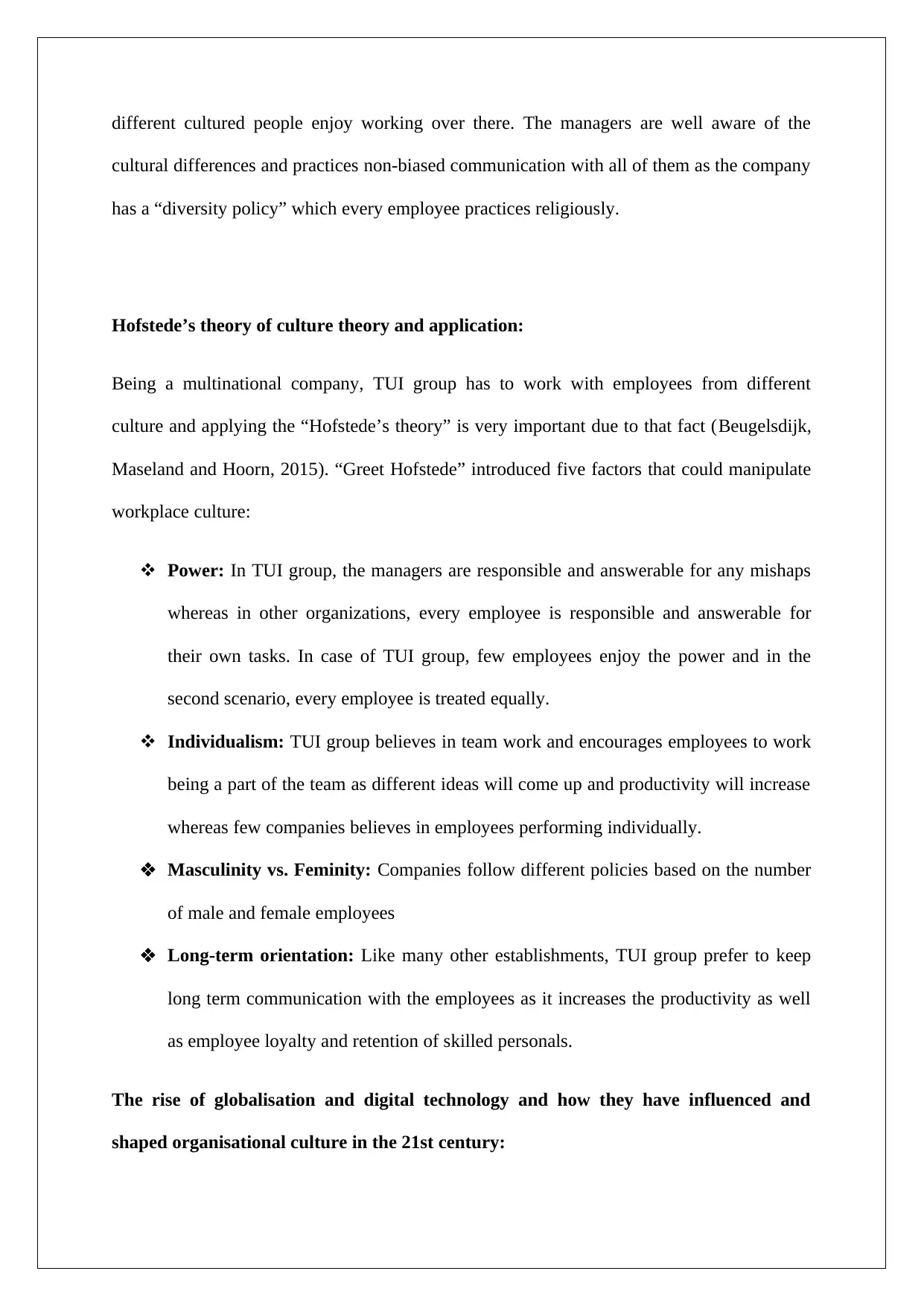
different cultured people enjoy working over there. The managers are well aware of the
cultural differences and practices non-biased communication with all of them as the company
has a “diversity policy” which every employee practices religiously.
Hofstede’s theory of culture theory and application:
Being a multinational company, TUI group has to work with employees from different
culture and applying the “Hofstede’s theory” is very important due to that fact (Beugelsdijk,
Maseland and Hoorn, 2015). “Greet Hofstede” introduced five factors that could manipulate
workplace culture:
Power: In TUI group, the managers are responsible and answerable for any mishaps
whereas in other organizations, every employee is responsible and answerable for
their own tasks. In case of TUI group, few employees enjoy the power and in the
second scenario, every employee is treated equally.
Individualism: TUI group believes in team work and encourages employees to work
being a part of the team as different ideas will come up and productivity will increase
whereas few companies believes in employees performing individually.
Masculinity vs. Feminity: Companies follow different policies based on the number
of male and female employees
Long-term orientation: Like many other establishments, TUI group prefer to keep
long term communication with the employees as it increases the productivity as well
as employee loyalty and retention of skilled personals.
The rise of globalisation and digital technology and how they have influenced and
shaped organisational culture in the 21st century:
cultural differences and practices non-biased communication with all of them as the company
has a “diversity policy” which every employee practices religiously.
Hofstede’s theory of culture theory and application:
Being a multinational company, TUI group has to work with employees from different
culture and applying the “Hofstede’s theory” is very important due to that fact (Beugelsdijk,
Maseland and Hoorn, 2015). “Greet Hofstede” introduced five factors that could manipulate
workplace culture:
Power: In TUI group, the managers are responsible and answerable for any mishaps
whereas in other organizations, every employee is responsible and answerable for
their own tasks. In case of TUI group, few employees enjoy the power and in the
second scenario, every employee is treated equally.
Individualism: TUI group believes in team work and encourages employees to work
being a part of the team as different ideas will come up and productivity will increase
whereas few companies believes in employees performing individually.
Masculinity vs. Feminity: Companies follow different policies based on the number
of male and female employees
Long-term orientation: Like many other establishments, TUI group prefer to keep
long term communication with the employees as it increases the productivity as well
as employee loyalty and retention of skilled personals.
The rise of globalisation and digital technology and how they have influenced and
shaped organisational culture in the 21st century:
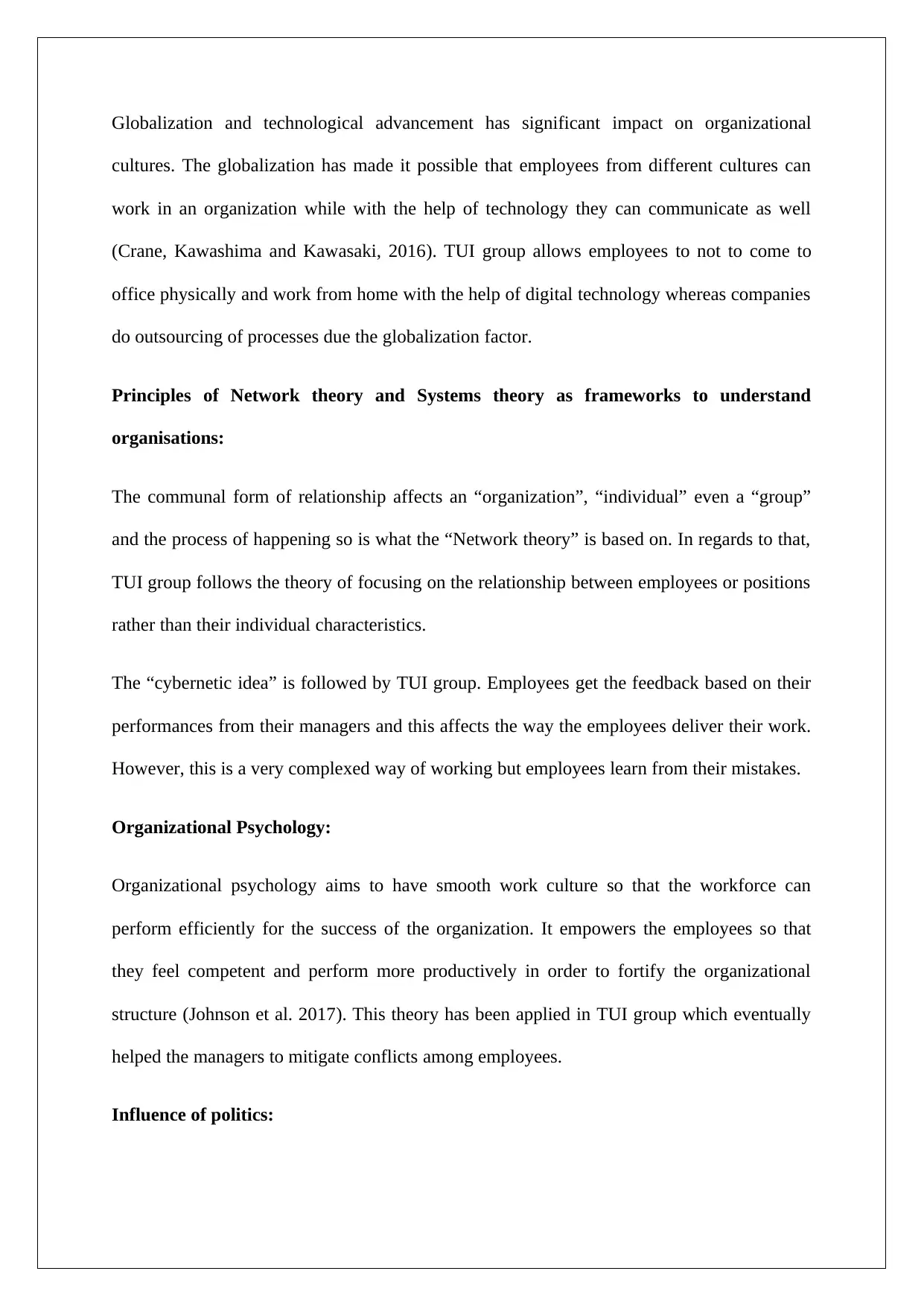
Globalization and technological advancement has significant impact on organizational
cultures. The globalization has made it possible that employees from different cultures can
work in an organization while with the help of technology they can communicate as well
(Crane, Kawashima and Kawasaki, 2016). TUI group allows employees to not to come to
office physically and work from home with the help of digital technology whereas companies
do outsourcing of processes due the globalization factor.
Principles of Network theory and Systems theory as frameworks to understand
organisations:
The communal form of relationship affects an “organization”, “individual” even a “group”
and the process of happening so is what the “Network theory” is based on. In regards to that,
TUI group follows the theory of focusing on the relationship between employees or positions
rather than their individual characteristics.
The “cybernetic idea” is followed by TUI group. Employees get the feedback based on their
performances from their managers and this affects the way the employees deliver their work.
However, this is a very complexed way of working but employees learn from their mistakes.
Organizational Psychology:
Organizational psychology aims to have smooth work culture so that the workforce can
perform efficiently for the success of the organization. It empowers the employees so that
they feel competent and perform more productively in order to fortify the organizational
structure (Johnson et al. 2017). This theory has been applied in TUI group which eventually
helped the managers to mitigate conflicts among employees.
Influence of politics:
cultures. The globalization has made it possible that employees from different cultures can
work in an organization while with the help of technology they can communicate as well
(Crane, Kawashima and Kawasaki, 2016). TUI group allows employees to not to come to
office physically and work from home with the help of digital technology whereas companies
do outsourcing of processes due the globalization factor.
Principles of Network theory and Systems theory as frameworks to understand
organisations:
The communal form of relationship affects an “organization”, “individual” even a “group”
and the process of happening so is what the “Network theory” is based on. In regards to that,
TUI group follows the theory of focusing on the relationship between employees or positions
rather than their individual characteristics.
The “cybernetic idea” is followed by TUI group. Employees get the feedback based on their
performances from their managers and this affects the way the employees deliver their work.
However, this is a very complexed way of working but employees learn from their mistakes.
Organizational Psychology:
Organizational psychology aims to have smooth work culture so that the workforce can
perform efficiently for the success of the organization. It empowers the employees so that
they feel competent and perform more productively in order to fortify the organizational
structure (Johnson et al. 2017). This theory has been applied in TUI group which eventually
helped the managers to mitigate conflicts among employees.
Influence of politics:
⊘ This is a preview!⊘
Do you want full access?
Subscribe today to unlock all pages.

Trusted by 1+ million students worldwide
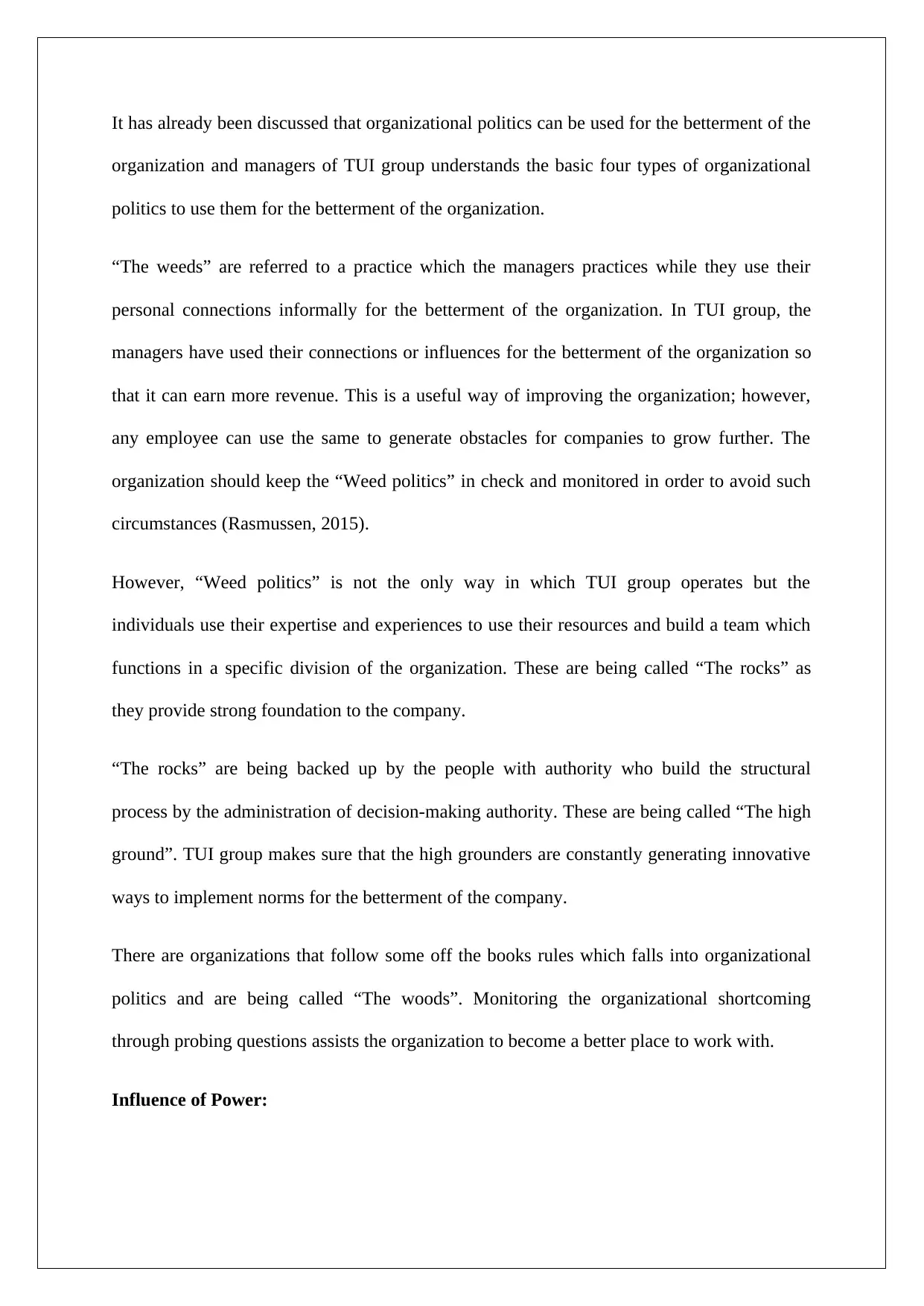
It has already been discussed that organizational politics can be used for the betterment of the
organization and managers of TUI group understands the basic four types of organizational
politics to use them for the betterment of the organization.
“The weeds” are referred to a practice which the managers practices while they use their
personal connections informally for the betterment of the organization. In TUI group, the
managers have used their connections or influences for the betterment of the organization so
that it can earn more revenue. This is a useful way of improving the organization; however,
any employee can use the same to generate obstacles for companies to grow further. The
organization should keep the “Weed politics” in check and monitored in order to avoid such
circumstances (Rasmussen, 2015).
However, “Weed politics” is not the only way in which TUI group operates but the
individuals use their expertise and experiences to use their resources and build a team which
functions in a specific division of the organization. These are being called “The rocks” as
they provide strong foundation to the company.
“The rocks” are being backed up by the people with authority who build the structural
process by the administration of decision-making authority. These are being called “The high
ground”. TUI group makes sure that the high grounders are constantly generating innovative
ways to implement norms for the betterment of the company.
There are organizations that follow some off the books rules which falls into organizational
politics and are being called “The woods”. Monitoring the organizational shortcoming
through probing questions assists the organization to become a better place to work with.
Influence of Power:
organization and managers of TUI group understands the basic four types of organizational
politics to use them for the betterment of the organization.
“The weeds” are referred to a practice which the managers practices while they use their
personal connections informally for the betterment of the organization. In TUI group, the
managers have used their connections or influences for the betterment of the organization so
that it can earn more revenue. This is a useful way of improving the organization; however,
any employee can use the same to generate obstacles for companies to grow further. The
organization should keep the “Weed politics” in check and monitored in order to avoid such
circumstances (Rasmussen, 2015).
However, “Weed politics” is not the only way in which TUI group operates but the
individuals use their expertise and experiences to use their resources and build a team which
functions in a specific division of the organization. These are being called “The rocks” as
they provide strong foundation to the company.
“The rocks” are being backed up by the people with authority who build the structural
process by the administration of decision-making authority. These are being called “The high
ground”. TUI group makes sure that the high grounders are constantly generating innovative
ways to implement norms for the betterment of the company.
There are organizations that follow some off the books rules which falls into organizational
politics and are being called “The woods”. Monitoring the organizational shortcoming
through probing questions assists the organization to become a better place to work with.
Influence of Power:
Paraphrase This Document
Need a fresh take? Get an instant paraphrase of this document with our AI Paraphraser
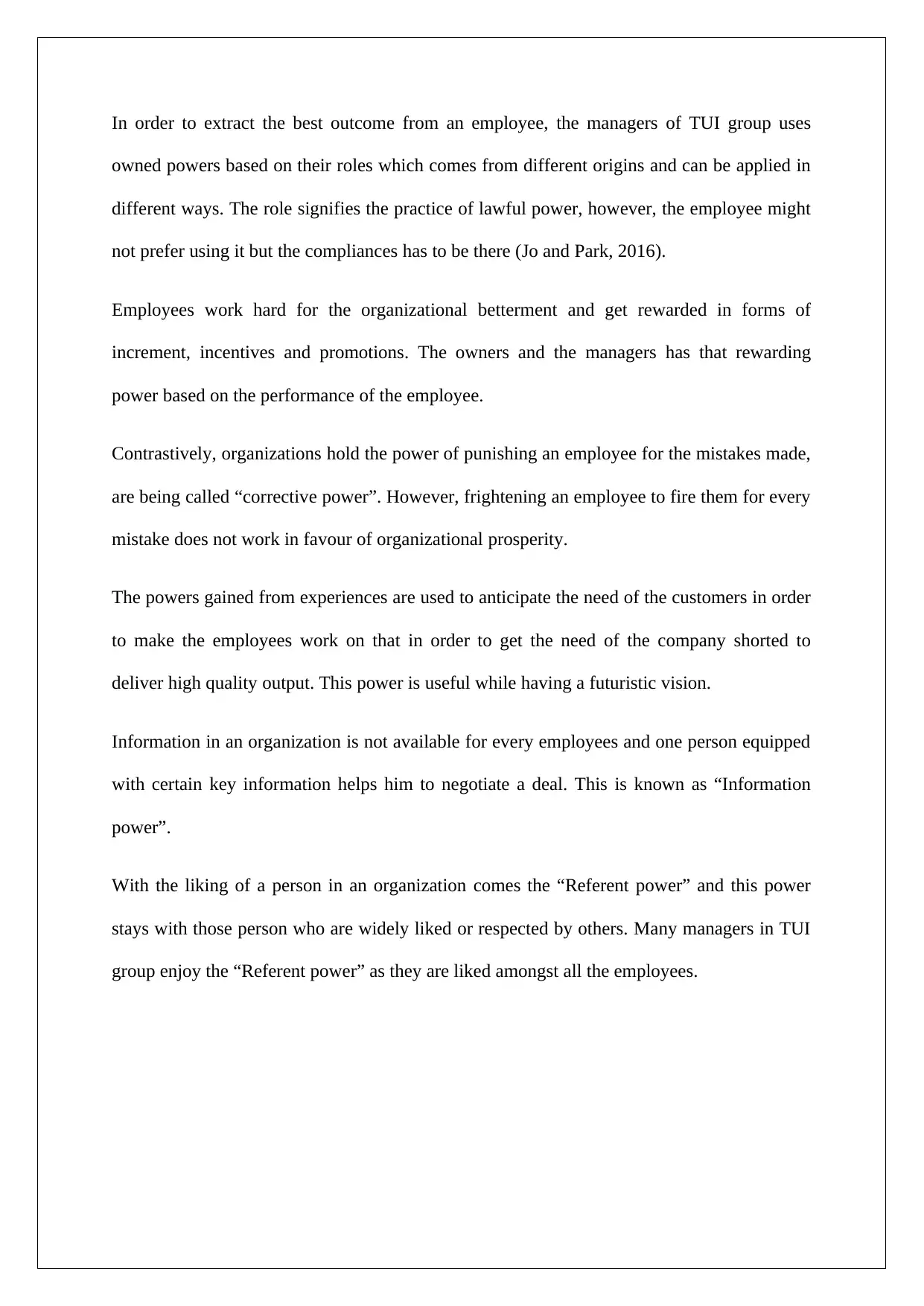
In order to extract the best outcome from an employee, the managers of TUI group uses
owned powers based on their roles which comes from different origins and can be applied in
different ways. The role signifies the practice of lawful power, however, the employee might
not prefer using it but the compliances has to be there (Jo and Park, 2016).
Employees work hard for the organizational betterment and get rewarded in forms of
increment, incentives and promotions. The owners and the managers has that rewarding
power based on the performance of the employee.
Contrastively, organizations hold the power of punishing an employee for the mistakes made,
are being called “corrective power”. However, frightening an employee to fire them for every
mistake does not work in favour of organizational prosperity.
The powers gained from experiences are used to anticipate the need of the customers in order
to make the employees work on that in order to get the need of the company shorted to
deliver high quality output. This power is useful while having a futuristic vision.
Information in an organization is not available for every employees and one person equipped
with certain key information helps him to negotiate a deal. This is known as “Information
power”.
With the liking of a person in an organization comes the “Referent power” and this power
stays with those person who are widely liked or respected by others. Many managers in TUI
group enjoy the “Referent power” as they are liked amongst all the employees.
owned powers based on their roles which comes from different origins and can be applied in
different ways. The role signifies the practice of lawful power, however, the employee might
not prefer using it but the compliances has to be there (Jo and Park, 2016).
Employees work hard for the organizational betterment and get rewarded in forms of
increment, incentives and promotions. The owners and the managers has that rewarding
power based on the performance of the employee.
Contrastively, organizations hold the power of punishing an employee for the mistakes made,
are being called “corrective power”. However, frightening an employee to fire them for every
mistake does not work in favour of organizational prosperity.
The powers gained from experiences are used to anticipate the need of the customers in order
to make the employees work on that in order to get the need of the company shorted to
deliver high quality output. This power is useful while having a futuristic vision.
Information in an organization is not available for every employees and one person equipped
with certain key information helps him to negotiate a deal. This is known as “Information
power”.
With the liking of a person in an organization comes the “Referent power” and this power
stays with those person who are widely liked or respected by others. Many managers in TUI
group enjoy the “Referent power” as they are liked amongst all the employees.
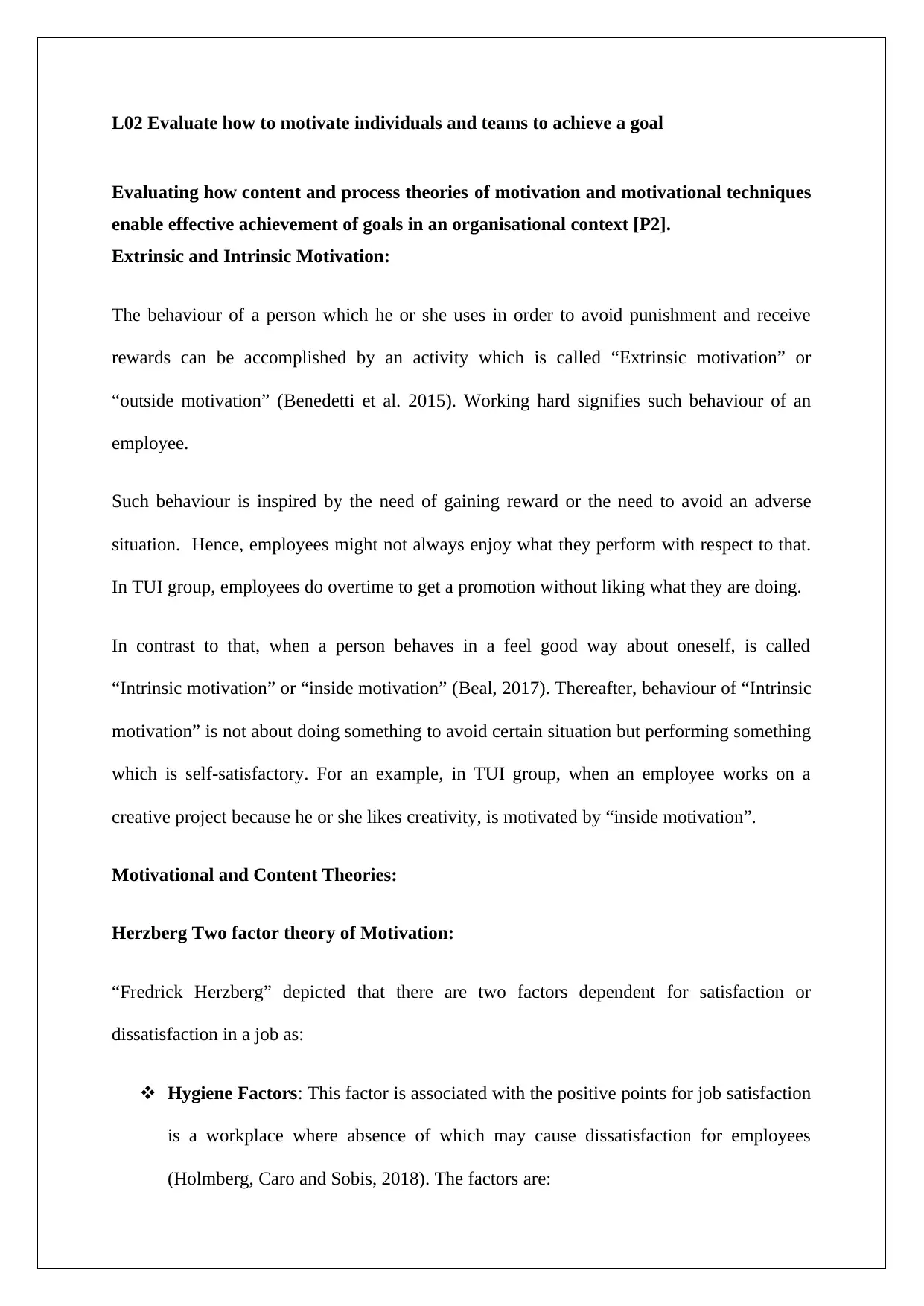
L02 Evaluate how to motivate individuals and teams to achieve a goal
Evaluating how content and process theories of motivation and motivational techniques
enable effective achievement of goals in an organisational context [P2].
Extrinsic and Intrinsic Motivation:
The behaviour of a person which he or she uses in order to avoid punishment and receive
rewards can be accomplished by an activity which is called “Extrinsic motivation” or
“outside motivation” (Benedetti et al. 2015). Working hard signifies such behaviour of an
employee.
Such behaviour is inspired by the need of gaining reward or the need to avoid an adverse
situation. Hence, employees might not always enjoy what they perform with respect to that.
In TUI group, employees do overtime to get a promotion without liking what they are doing.
In contrast to that, when a person behaves in a feel good way about oneself, is called
“Intrinsic motivation” or “inside motivation” (Beal, 2017). Thereafter, behaviour of “Intrinsic
motivation” is not about doing something to avoid certain situation but performing something
which is self-satisfactory. For an example, in TUI group, when an employee works on a
creative project because he or she likes creativity, is motivated by “inside motivation”.
Motivational and Content Theories:
Herzberg Two factor theory of Motivation:
“Fredrick Herzberg” depicted that there are two factors dependent for satisfaction or
dissatisfaction in a job as:
Hygiene Factors: This factor is associated with the positive points for job satisfaction
is a workplace where absence of which may cause dissatisfaction for employees
(Holmberg, Caro and Sobis, 2018). The factors are:
Evaluating how content and process theories of motivation and motivational techniques
enable effective achievement of goals in an organisational context [P2].
Extrinsic and Intrinsic Motivation:
The behaviour of a person which he or she uses in order to avoid punishment and receive
rewards can be accomplished by an activity which is called “Extrinsic motivation” or
“outside motivation” (Benedetti et al. 2015). Working hard signifies such behaviour of an
employee.
Such behaviour is inspired by the need of gaining reward or the need to avoid an adverse
situation. Hence, employees might not always enjoy what they perform with respect to that.
In TUI group, employees do overtime to get a promotion without liking what they are doing.
In contrast to that, when a person behaves in a feel good way about oneself, is called
“Intrinsic motivation” or “inside motivation” (Beal, 2017). Thereafter, behaviour of “Intrinsic
motivation” is not about doing something to avoid certain situation but performing something
which is self-satisfactory. For an example, in TUI group, when an employee works on a
creative project because he or she likes creativity, is motivated by “inside motivation”.
Motivational and Content Theories:
Herzberg Two factor theory of Motivation:
“Fredrick Herzberg” depicted that there are two factors dependent for satisfaction or
dissatisfaction in a job as:
Hygiene Factors: This factor is associated with the positive points for job satisfaction
is a workplace where absence of which may cause dissatisfaction for employees
(Holmberg, Caro and Sobis, 2018). The factors are:
⊘ This is a preview!⊘
Do you want full access?
Subscribe today to unlock all pages.

Trusted by 1+ million students worldwide
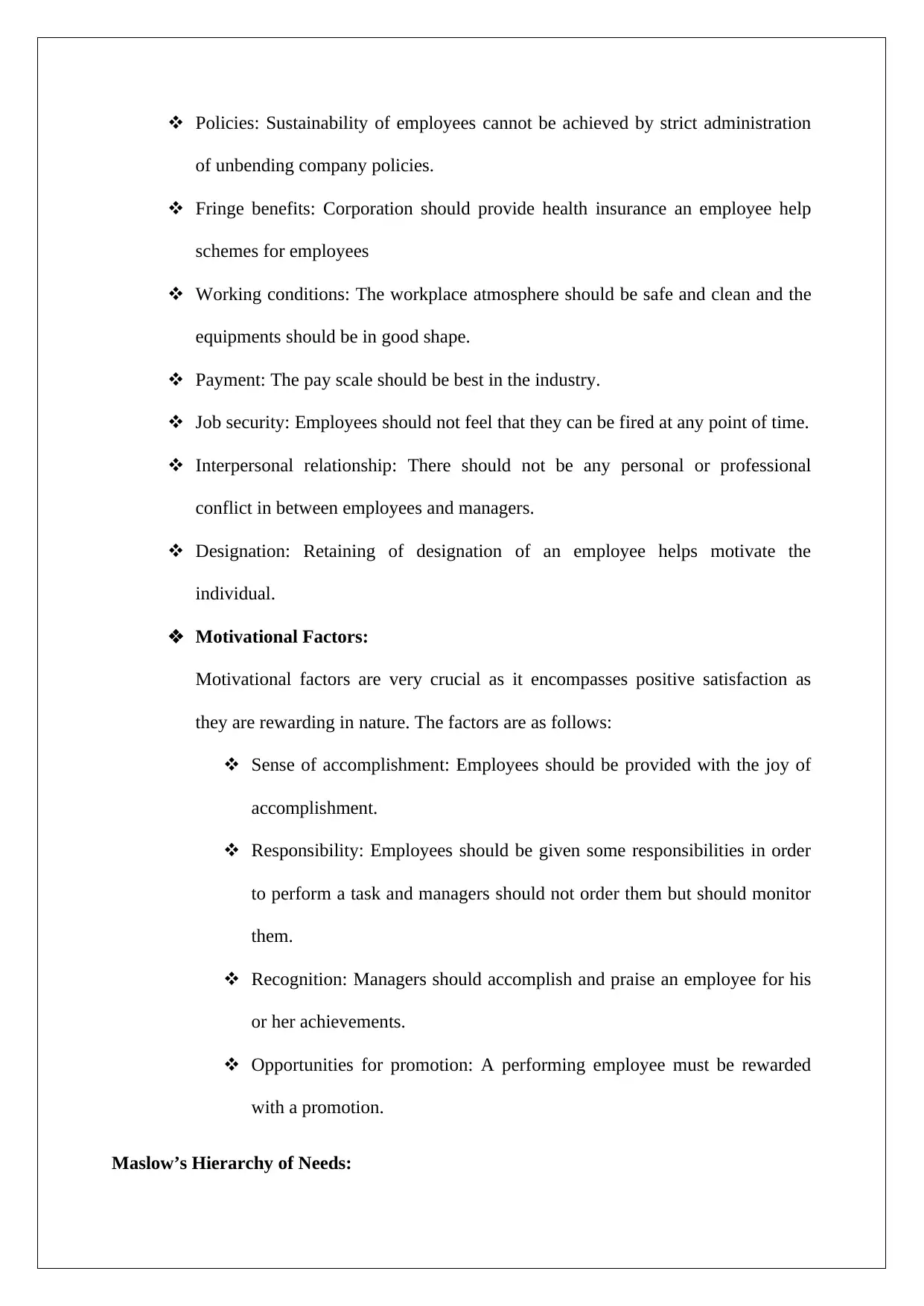
Policies: Sustainability of employees cannot be achieved by strict administration
of unbending company policies.
Fringe benefits: Corporation should provide health insurance an employee help
schemes for employees
Working conditions: The workplace atmosphere should be safe and clean and the
equipments should be in good shape.
Payment: The pay scale should be best in the industry.
Job security: Employees should not feel that they can be fired at any point of time.
Interpersonal relationship: There should not be any personal or professional
conflict in between employees and managers.
Designation: Retaining of designation of an employee helps motivate the
individual.
Motivational Factors:
Motivational factors are very crucial as it encompasses positive satisfaction as
they are rewarding in nature. The factors are as follows:
Sense of accomplishment: Employees should be provided with the joy of
accomplishment.
Responsibility: Employees should be given some responsibilities in order
to perform a task and managers should not order them but should monitor
them.
Recognition: Managers should accomplish and praise an employee for his
or her achievements.
Opportunities for promotion: A performing employee must be rewarded
with a promotion.
Maslow’s Hierarchy of Needs:
of unbending company policies.
Fringe benefits: Corporation should provide health insurance an employee help
schemes for employees
Working conditions: The workplace atmosphere should be safe and clean and the
equipments should be in good shape.
Payment: The pay scale should be best in the industry.
Job security: Employees should not feel that they can be fired at any point of time.
Interpersonal relationship: There should not be any personal or professional
conflict in between employees and managers.
Designation: Retaining of designation of an employee helps motivate the
individual.
Motivational Factors:
Motivational factors are very crucial as it encompasses positive satisfaction as
they are rewarding in nature. The factors are as follows:
Sense of accomplishment: Employees should be provided with the joy of
accomplishment.
Responsibility: Employees should be given some responsibilities in order
to perform a task and managers should not order them but should monitor
them.
Recognition: Managers should accomplish and praise an employee for his
or her achievements.
Opportunities for promotion: A performing employee must be rewarded
with a promotion.
Maslow’s Hierarchy of Needs:
Paraphrase This Document
Need a fresh take? Get an instant paraphrase of this document with our AI Paraphraser
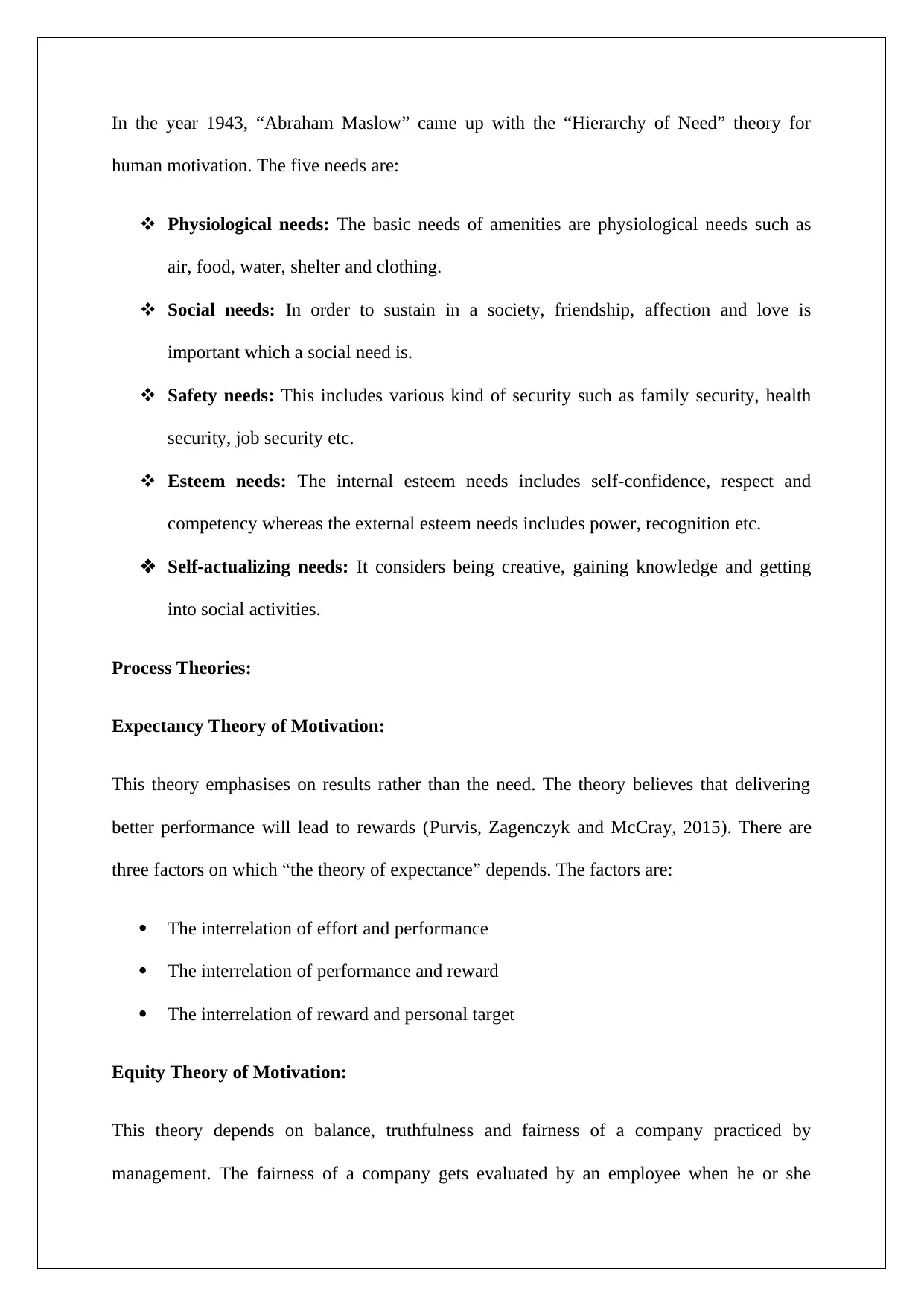
In the year 1943, “Abraham Maslow” came up with the “Hierarchy of Need” theory for
human motivation. The five needs are:
Physiological needs: The basic needs of amenities are physiological needs such as
air, food, water, shelter and clothing.
Social needs: In order to sustain in a society, friendship, affection and love is
important which a social need is.
Safety needs: This includes various kind of security such as family security, health
security, job security etc.
Esteem needs: The internal esteem needs includes self-confidence, respect and
competency whereas the external esteem needs includes power, recognition etc.
Self-actualizing needs: It considers being creative, gaining knowledge and getting
into social activities.
Process Theories:
Expectancy Theory of Motivation:
This theory emphasises on results rather than the need. The theory believes that delivering
better performance will lead to rewards (Purvis, Zagenczyk and McCray, 2015). There are
three factors on which “the theory of expectance” depends. The factors are:
The interrelation of effort and performance
The interrelation of performance and reward
The interrelation of reward and personal target
Equity Theory of Motivation:
This theory depends on balance, truthfulness and fairness of a company practiced by
management. The fairness of a company gets evaluated by an employee when he or she
human motivation. The five needs are:
Physiological needs: The basic needs of amenities are physiological needs such as
air, food, water, shelter and clothing.
Social needs: In order to sustain in a society, friendship, affection and love is
important which a social need is.
Safety needs: This includes various kind of security such as family security, health
security, job security etc.
Esteem needs: The internal esteem needs includes self-confidence, respect and
competency whereas the external esteem needs includes power, recognition etc.
Self-actualizing needs: It considers being creative, gaining knowledge and getting
into social activities.
Process Theories:
Expectancy Theory of Motivation:
This theory emphasises on results rather than the need. The theory believes that delivering
better performance will lead to rewards (Purvis, Zagenczyk and McCray, 2015). There are
three factors on which “the theory of expectance” depends. The factors are:
The interrelation of effort and performance
The interrelation of performance and reward
The interrelation of reward and personal target
Equity Theory of Motivation:
This theory depends on balance, truthfulness and fairness of a company practiced by
management. The fairness of a company gets evaluated by an employee when he or she
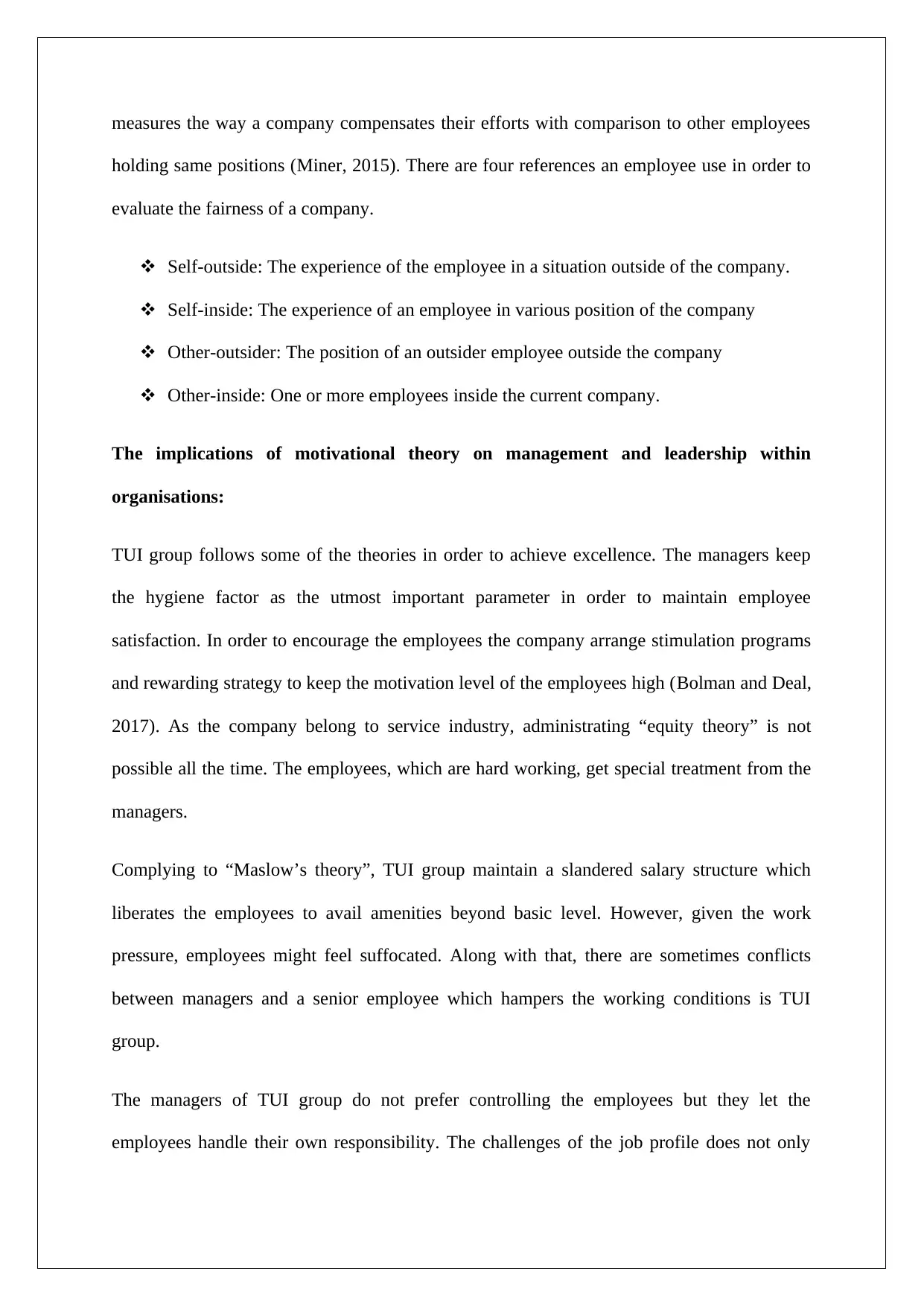
measures the way a company compensates their efforts with comparison to other employees
holding same positions (Miner, 2015). There are four references an employee use in order to
evaluate the fairness of a company.
Self-outside: The experience of the employee in a situation outside of the company.
Self-inside: The experience of an employee in various position of the company
Other-outsider: The position of an outsider employee outside the company
Other-inside: One or more employees inside the current company.
The implications of motivational theory on management and leadership within
organisations:
TUI group follows some of the theories in order to achieve excellence. The managers keep
the hygiene factor as the utmost important parameter in order to maintain employee
satisfaction. In order to encourage the employees the company arrange stimulation programs
and rewarding strategy to keep the motivation level of the employees high (Bolman and Deal,
2017). As the company belong to service industry, administrating “equity theory” is not
possible all the time. The employees, which are hard working, get special treatment from the
managers.
Complying to “Maslow’s theory”, TUI group maintain a slandered salary structure which
liberates the employees to avail amenities beyond basic level. However, given the work
pressure, employees might feel suffocated. Along with that, there are sometimes conflicts
between managers and a senior employee which hampers the working conditions is TUI
group.
The managers of TUI group do not prefer controlling the employees but they let the
employees handle their own responsibility. The challenges of the job profile does not only
holding same positions (Miner, 2015). There are four references an employee use in order to
evaluate the fairness of a company.
Self-outside: The experience of the employee in a situation outside of the company.
Self-inside: The experience of an employee in various position of the company
Other-outsider: The position of an outsider employee outside the company
Other-inside: One or more employees inside the current company.
The implications of motivational theory on management and leadership within
organisations:
TUI group follows some of the theories in order to achieve excellence. The managers keep
the hygiene factor as the utmost important parameter in order to maintain employee
satisfaction. In order to encourage the employees the company arrange stimulation programs
and rewarding strategy to keep the motivation level of the employees high (Bolman and Deal,
2017). As the company belong to service industry, administrating “equity theory” is not
possible all the time. The employees, which are hard working, get special treatment from the
managers.
Complying to “Maslow’s theory”, TUI group maintain a slandered salary structure which
liberates the employees to avail amenities beyond basic level. However, given the work
pressure, employees might feel suffocated. Along with that, there are sometimes conflicts
between managers and a senior employee which hampers the working conditions is TUI
group.
The managers of TUI group do not prefer controlling the employees but they let the
employees handle their own responsibility. The challenges of the job profile does not only
⊘ This is a preview!⊘
Do you want full access?
Subscribe today to unlock all pages.

Trusted by 1+ million students worldwide
1 out of 28
Related Documents
Your All-in-One AI-Powered Toolkit for Academic Success.
+13062052269
info@desklib.com
Available 24*7 on WhatsApp / Email
![[object Object]](/_next/static/media/star-bottom.7253800d.svg)
Unlock your academic potential
Copyright © 2020–2026 A2Z Services. All Rights Reserved. Developed and managed by ZUCOL.


